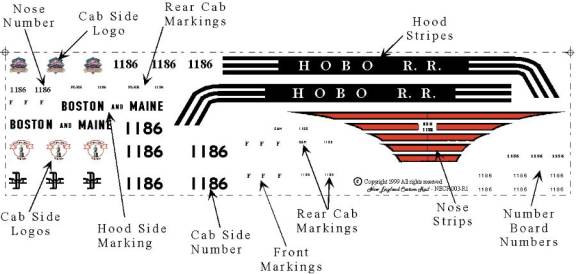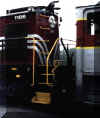What
does it Cost to do a Custom Engine or Car?
This is a question we here at New England Custom Rail get asked all the time for which there is no simple answer. Some of the decisions a customer must make, which contribute to the final pricing of a custom engine, are the following:
- Is
the customer supplying the engine or car?
- Is
the engine or car undecorated, or does it have to be paint stripped?
- Does
the frame have to be painted?
- How
many colors and painting operations will be involved? (This needs to
include a primer base coat and a clear sealer coat for the final
product.)
- Do
decals for this engine or car already exist, or do custom decals
have to be created?
- Are
we painting to an existing paint scheme or do we have to design one?
- Is
the customer supplying the initial artwork?
- How
many decals will need to be applied? (Complex or simple
applications?)
- Is
there an additional market for any custom decals?
- Does
the customer want detailing done as well as painting?
- How
many detail parts will be required?
- Will
there be additional electrical work?
- Does
the unit require a DCC installation?
- Will
sound be added?
As
you can see there are a lot of answers the customer must have to allow
us to give them an estimated price. If it is known that custom decals
will need to be generated then a significant amount of non-recurring
work will need to be done to create the original artwork needed to
create the decals. This can be done but it does take time and it does
cost money.
To
help you better understand the process we follow here at New
England Custom Rail let us now look at each of these
issues.
If
the customer supplies the engine, then
there is the shipping and insurance cost which the customer must pay. It
is usually cheaper for us to find the unit than the cost of shipping and
insurance. Insurance is strongly recommended when shipping to New
England Custom Rail and is required when the item is shipped
back to the customer from New England Custom Rail If the
item is to be procured for the customer by New England Custom Rail,
(as a rule of thumb) plan for the pricing to be what you would find in
the Walthers catalogue, which we use, for reference purposes. If the
item is not in production and has to be found, then there is an
additional small fee of $45 for the location service being provided.
If
the engine or car is not an undecorated unit and
has to be paint stripped, there is a fee for stripping the shell
(HO scale) and if necessary an additional fee for stripping the frame
(due to electrical work which needs to be done before the stripping can
be performed). This work is done on an hourly basis and will depend on
the complexity of the pieces involved.
The other option is to do a “paint over”. That is to paint
the unit with a coat of primer over the existing paint scheme. In
reality this is what many railroads do which is why you can sometimes
see ghost images of prior markings under an existing paint job when
looking at an actual engine or car. It is a very expensive and time
consuming process to sand blast a full size engine or car. So sometimes
a railroad will skip this process especially if the existing paint job
looks good and shows no rust. For the purposes of discussion within this
document we are going to use an undecorated Atlas engine which we will
custom paint and decal and detail for PLRR # 1186 of the Hobo R. R. of
Lincoln New Hampshire.
At
this point all we have is an undecorated engine. Next we need to know
how the unit is to be painted. Let’s say you are requesting a paint
scheme used by a particular prototype. Pictures or drawings of that
particular engine will need to be acquired and supplied. For example,
see the following photos which were used to generate the Hobo
Railroad’s 1186.
Side
view required showing stripe placement, lettering styles and paint
scheme.
This
photo required to be used to generate Cab logo decal.
This
photo shows rear cab detail and lettering.
Shows
details of horn, exhaust stack, and decal placement.
Shows
additional details of nose area.
All
of these photos were required for just one version of one particular
engine. You may need less depending on the prototype you choose or you
might need more. Your prototype might be documented in a book or
magazine. The source of items is not important, the quality is. The
better the quality the better the final product will be in approximating
the prototype.
As
you can see from the photos above, this particular engine has two major
colors in its paint scheme of maroon and
black. The silver of the stripes will be done as a decal and as such
will not be counted as a paint scheme color. If the striping were to be
painted then the cost would go up due to the complex masking operations
that would be necessary. For this engine the decal is the way to go. The
yellow of the steps and handrails and grab irons, which would be part of
any detailing if requested and not a paint scheme color. In general a
single color paint scheme is $45, a two-color scheme is between $60 and
$80 and a three-color scheme is between $70 and $110. The variation
would be due to complexity of the masking required for the particular
paint job. Fancy complex stripes could drive a paint job into the range
of over $450. Any paint scheme more complicated than three colors would
be a special quote.
For
this particular engine the decals did not exist.
So, if it took approximately 10+ hours to generate
the artwork necessary to print the decals for that single engine
(in that form), then the customer will be responsible for the whole
amount. If New England Custom Rail does see a market for
additional sales of a particular prototype and is given permission by
any copyright owner, then the customer will not be required to pay the
total cost for this special work (currently $45/hr). The HOBO prototype
required a decal set, which looked like the following sample. It also
includes two additional version of the same engine. (Please note the
sample below is missing the four “Danger 600 Volts” decals and white
and yellow frame markers that were added to the final decal set. You
will also note that additional decals were generated for the engines
prior history)

Decal
application costs are pretty straightforward, they are based on a labor rate of $45/hr.
What adds to the standard time estimate is when the
application becomes complex. For example where a decal needs to be
snugged down over complex cast body details (example the radiator grill
work on an Alco S4 shell), the additional application of decal setting
solution takes additional time. This makes estimating much more
difficult.
Now if commercial decals are available the cost for the decals could be
as little as $5. If not, it could go as high as $350 to $400 for a
single engine, if no additional sales are anticipated. What is hard to
tell someone is how much work is required to generate the artwork,
especially if we do not have the photos in front of us. If what the
customer is requesting, turns out to be mostly text, then the cost to
create the artwork and a set of decals could be as little as $50.
If
the customer can supply computer generated artwork to scale, then the
time it will take and the cost will be significantly less. If no
additional work is required a single page of decals can be printed for
$50. If metallic gold or silver is required then the single page cost is
$60. If multiple units can be supported from a single page then the cost
gets spread across all of those units. The biggest part of the cost is
the one time cost associated with the creation of any original graphic
artwork.
The
next big unknown has to do with whether or not the customer wants detailing
done and then to what level. If they want twenty to thirty detail parts
added, the cost is significantly greater than if they just want some
hand painting of step edges and grab irons and Kadee couplers added.
Here again we use the Walthers catalogue as a guide for parts pricing.
In addition, the labor associated with the installation of any part can,
in general, be estimated by tripling the parts cost. For example, if a
bell cost $3 then an installation charge of around $9 would be in the
ballpark for the installation of the painted part. There certainly are
exceptions depending on the part. For example, the snowplow on the HOBO
model only cost around $4. However, the installation is around $53
because it requires grinding the metal pilot area of the frame and then
drilling the pilot for mounting holes and filing the back of the plow
for it to fit properly and then getting a special long coupler to mount
it properly, then painting the modified frame and the parts the
appropriate colors.
To
summarize the process we follow here at New England Custom Rail is
as follows: we normally discuss a project with a potential customer
making sure we understand their wants. Then we might generate a drawing
of what believe the finished project would look like. Once we have
agreement on these particulars we then formulate an estimated price. If
the customer agrees then we ask for a deposit of 50% of the project cost
before booking the project. Once booked, we then look at our scheduling
and give the customer an estimated date.
Hopefully
this document gives you a little better idea of what goes into
determining what it takes to answer the question “What does it
cost?” Custom work does cost significantly more than “Ready to
Run” mass produced units that you can buy at the local hobby shop. But
if you have graduated to collecting unique museum quality pieces that
function as good as they look, then give us a call or send us a request.
We feel that the custom units we produce will give you years of
enjoyment and become the centerpieces of your model train collection.
Please remember that what we produce here are limited production custom
units for customers. We do not build units for inventory. So when you
place an order we can only estimate how long it may take based on the
complexity of your project and the other work that has been booked at
the time of your deposit.




